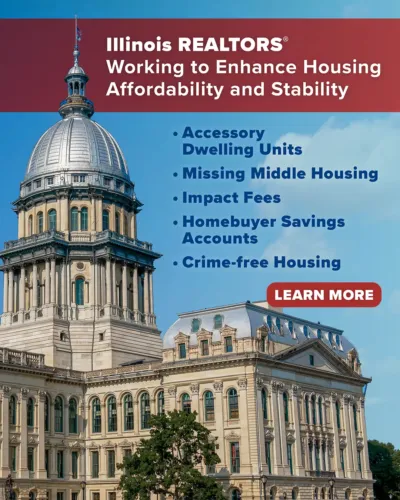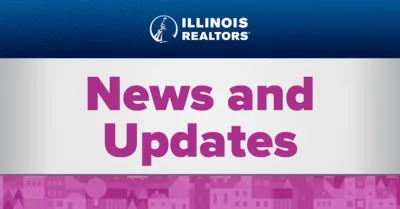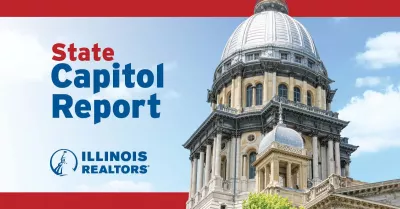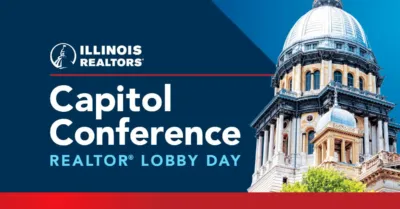From negotiating leases to disclosure, here’s what you need to know about the new state law
On Jan. 1, 2020, Illinois becomes the 11th state in the country where the recreational use of marijuana is legal. The new law allows adults aged 21 and older to purchase regulated marijuana from licensed dispensaries around the state.
Illinois already allows for medical marijuana but this new shift legalizing recreational use will greatly broaden the industry’s impact not just on the state’s economy but also the real estate industry.
How will a legalized marijuana industry affect commercial and residential real estate? Illinois REALTOR® talked to those with experience locating dispensaries, REALTOR® associations who lobbied to adjust regulations and lawyers who are working to provide guidance.

At a Glance: The Cannabis Regulation and Tax Act
Beginning Jan. 1, 2020, Illinois residents over the age of 21 will be able to purchase, possess and recreationally use cannabis products. The cannabis must be purchased from licensed dispensaries and there are limits on how much you can possess.
- 30 grams of cannabis flower
- Five grams of cannabis concentrate
- No more than 500 milligrams of THC in cannabis-infused products
- Possession limits for non-Illinois residents are half that of residents
Illinois home growing limited to medical marijuana users
The state’s medical cannabis program will continue and only those people will be allowed to grow cannabis in their homes. Home growing will be limited to no more than five plants that are five inches or taller. Plants must be enclosed in a secured location.
Local governments can opt out
Home rule units and some non-home rule counties can enact ordinances and zoning restrictions to prohibit or limit the establishment of cannabis businesses within their boundaries. Local governments can also regulate on-premises consumption at or in a cannabis business.
Creating social equity in the industry
Low-interest loans to help offset expensive start-up costs and lower application fees are meant to encourage minority business ownership in areas disproportionately impacted by the war on drugs. A portion of tax revenue generated from the cannabis industry will be directed back into those communities.
Source: “Adult Use Cannabis Summary” bit.ly/IL_Cannabis_Summary


REALTOR® Deena Zimmerman, vice president of SVN Chicago Commercial
Impact on the commercial market
If there is one area that will be most affected by legalized marijuana, it’s commercial real estate.
Twenty growing facilities and 55 dispensaries were licensed in Illinois when medical marijuana was legalized in 2014. That number is expected to increase now that the state has expanded marijuana use to all adults 21 and older.
Under the newly passed law, Illinois will phase in new licenses for dispensaries, infusers, craft growers and transporters over the next few years. That will mean heightened interest in industrial and retail sites that could be used for marijuana production and sales.
“I hope it will be a nice steady growth,” says REALTOR® Deena Zimmerman, vice president of SVN Chicago Commercial, who has worked with commercial retail clients since medical marijuana was legalized and is building a niche in the market.
Zimmerman said she noticed a shift in Illinois as soon as J.B. Pritzker, who spoke out in favor of legalized marijuana on the campaign trail, was elected governor. There was a greater sense of urgency by marijuana-related companies to scout out available locations because there will be more competition for the limited space available, she said.
That’s a big change from a few years ago when medical marijuana became law.
“Back then, you picked up the phone to call a broker or an owner regarding the use, they were like, ‘what, marijuana!’” Zimmerman said. “It was a big taboo.”
“The conversations are really different now,” she said. “Owners are more open to it because they understand financially what this will mean. (Tenants) still go through the same vetting process, probably more so actually.”
If Illinois is like Colorado, the expansion of marijuana could have a big impact on industrial real estate.

Scott Peterson, general counsel of the Colorado Association of REALTORS®
“There were a lot of landlords at the outset who said, ‘there’s no way I’m going to lease my property to a marijuana grower,’ only to find out that they became pretty fantastic (tenants) by and large,” said Scott Peterson, general counsel of the Colorado Association of REALTORS®
“They always paid their rent, they were willing to pay above market (price), they had low parking requirements generally and were pretty good users of industrial office space,” he said. “The industrial rents of downtown Denver have skyrocketed.”
Colorado was at the forefront of the legal marijuana movement and Peterson said the new industry helped boost the state’s real estate market during the recession.
“It saved a large segment, particularly metro Denver’s industrial market,” he said. “Those were the only people doing deals.”
Legalization has also been a boon for Colorado’s economy.

Elizabeth Peetz, vice president of government affairs for the Colorado Association of REALTORS®
Since recreational use was legalized in 2014, the state has collected more than $1 billion in tax revenue, some of which is earmarked for affordable housing measures, said Elizabeth Peetz, vice president of government affairs for the Colorado Association of REALTORS®.
Illinois REALTORS® should be mindful that working in the marijuana arena can be more complicated than typical commercial transactions.
The biggest issue is that even though marijuana use will be legal in Illinois, it is still illegal on the federal level. That means it is largely a cash business since clients can’t go through traditional, federally-backed banks for loans to purchase or lease property.
And even if a landlord or property owner is open to working with a marijuana client, some are still leery of the prospect of dealing with cash and where it is coming from, Zimmerman says. Some marijuana companies may choose to just buy their own property outright as a result.
There is also the prospect of finding suitable sites, particularly in urban areas since there are state and local restrictions on how close a growing facility or dispensary can be to schools, day cares and residential areas.
Because of these restrictions, Zimmerman said there could be heightened interest in secondary and tertiary markets where there is more available open space.
The legalization of medical marijuana has already brought in a number of marijuana growing companies that have located downstate cultivation centers in rural areas such as Delavan south of Peoria, the small community of Barry in Pike County and Kankakee.
Zimmerman acknowledges that not every REALTOR® will be interested in working with marijuana companies or investors. It is important, however, that everyone stay informed and open to the topic.
“You don’t have to get into it and represent clients because it is a lot of work,” she said. “But at least educate yourself because you would be doing your clients a disservice if you don’t understand the basic rules.”
Commercial Real Estate
In states where medical and recreational use is legal: 27 percent of REALTORS® had seen an increased demand for warehouse space, 17 percent in storefronts and 14 percent in land.
21% of members had seen commercial property values increase near dispensaries; 66 percent saw no change *
Residential growing more restricted in Illinois
The impact of legalized marijuana on Illinois’ residential market may be less pronounced than in other states simply because the state’s lawmakers put tight restrictions on who can legally grow marijuana in a home.
Only registered participants of Illinois’ medical marijuana program will be allowed to grow their own cannabis plants and they will be limited to no more than five plants which are five inches or taller. Cultivation must take place in an enclosed, locked space.
That’s a stark contrast to Colorado, which initially allowed as many as 99 plants per person in a home. With multiple people in a home, that could mean sizable – and sometimes illegal –commercial home-growing operations.
“That had an impact on residential safety, on smells or noxious odors, on people’s perceived sense of property values,” Peterson said. “We didn’t have a really good legislative definition or limitations on what home grows could be for a long time.”
In 2017, Colorado REALTORS® was among a broad coalition that lobbied the state legislature to reduce the number of plants which could be grown to 12 per household or 24 for those with a medical license and registration, said Colorado’s lobbyist Peetz. The legislation also allocated more money to enforce the rules change.
Nearby Michigan allows anyone to grow marijuana at home, but that state also sets the plant limit for personal cultivation at 12. Like Illinois, Michigan is in the early stages of establishing the industry.
Recreational marijuana was approved in 2018, but there have been roadblocks in getting the licensing structure set up for sales, said

Becky Gean, legal affairs manager for Michigan REALTORS®. The state is now anticipating sales to begin in 2020.
“As of right now, it’s kind of a weird limbo where it’s legalized, but there’s really nowhere to purchase it,” Gean says.
A top question from Michigan REALTORS® is whether they can safely work on transactions involving the marijuana industry, she said.
“There is a lot of uncertainty. They can do it, but just be aware,” she said. “REALTORS® are probably going to be asked for advice far outside of their area of expertise so if you are going to work with a client that wants a property for a marijuana purpose, tell them to get an attorney.”
Because of the federal issues, REALTORS® have to be aware that they probably won’t have a title company, escrowing or other elements of a more traditional transaction, Gean said.
Residential Real Estate
More than three-quarters of members in states where marijuana is legal had not seen a change in residential property values near dispensaries.
47% said there was available residential inventory despite all-cash purchases in the marijuana industry; only one percent said the industry has caused tightened housing inventory *
To disclose or not to disclose
Another big question that comes up involving residential properties and marijuana is whether sellers must disclose whether it was grown on the property.
Gean said for Michigan, the answer is ‘no’. Marijuana isn’t considered to be an environmental hazard so beyond that it would only be disclosing the usual material defects – water leaks, electrical issues or any other standard situations – that would be reported normally if present in a property, she said.
In states where there have been large, illegal growing operations, residential homes may have been rewired to bring in more electricity and the high moisture environment needed to grow plants could create other physical defects, such as mold.

Illinois REALTORS® General Counsel Betsy Urbance
Illinois REALTORS® General Counsel Betsy Urbance said that an agent’s duties should remain largely unchanged.
“Our brokers are not the marijuana police, nor are they the marijuana experts,” she said. “Our job is to recognize a defective condition generally. If the home is extra humid and they see a substance, they would do what they would any other time there appears to be an excess moisture situation.”
“I think all of the same concerns and duties remain unchanged, it’s just a different factual context,” Urbance said.
On the flip side, Colorado has found that a legal room set aside for growing marijuana can be a sought-after benefit for some homebuyers.
“If somebody has a nice lighting system and water system, ventilation and a good room in the center of the house where they can grow marijuana, that is considered an amenity for a lot of buyers,” Peterson said.
Residential Leasing
About one-third of residential property managers had seen addendums added to leases to restrict growing and smoking on properties.
36% of property managers have no issues leasing the property after marijuana use on the property; but 18 percent said the smell is difficult to remove *

Leasing & Property Management
Illinois’ new recreational marijuana law will allow adults to smoke marijuana or consume cannabis concentrate products in private residences, but what does that mean for someone living in a rental property?
Just as a landlord can craft a lease that prohibits cigarette smoking, it can also apply to smoking marijuana.
A landlord can’t tell a tenant they can’t use marijuana, but they are within their rights to prohibit smoking in general through a smoke-free policy as long as it is specifically written into a lease, Urbance said.
“If your home is a rental home and your landlord or property manager says the property is smoke free, then you can’t do it by means of smoking,” she said.
Michigan has fielded questions about the risk of civil asset forfeiture for residential property landlords or even commercial property owners who rent out warehouse space for grow operations.
Gean said Michigan extends protections to those using properties legally under the state’s recreational law. There might be a slight technical risk since marijuana is still illegal at the federal level, but multiple states have legalized possession and use of marijuana, medical and otherwise, and the federal government has made no move to enforce federal rules, she said.
Commercial Leasing
6% of commercial members leased to marijuana-related businesses in states where medical and recreational use were allowed.
Half of commercial members reported that no additional addendums were added to leases.
38% of landlords would not accept cash for rent *
Brokerages and office policies
The legalization of recreational marijuana also raises the question of whether brokerages should address usage in their office policies.
Urbance says a reasonable policy would be to generally require that agents not be impaired while on the job. Particular drug or alcohol use doesn’t have to be spelled out.
“You can’t really govern what someone does legally with their own time, but you can govern what someone does on your time,” Urbance said.
“You can have an office policy about not being impaired on the job, that just makes sense,” she said. “They are still operating under your shingle.”
In the video, “Window to the Law: Legal Marijuana and the Real Estate Professional,” National Association of REALTORS® legal staff also cautions against putting too many restrictions in place and blurring the line between contractors and employees.
“While independent contractors are allowed the freedom to conduct their business activities as they choose, a brokerage could include guidelines in its independent contractor agreement on the salesperson’s usage of legal marijuana,” NAR legal said. “The brokerage needs to be careful not to exercise too much control over its independent contractors to avoid having them classified as employees.”
Selling a Grow House
One in 20 of those surveyed had sold a grow house in areas where both recreational and medical marijuana are legal
67% said it was not hard to sell a grow house; 33 percent said it was
Seven in 10 disclosed it was a grow house *
More about the new law
There are other elements of the new law worth noting, including efforts to promote social equity and encourage minority industry ownership and development in Illinois communities that have been hardest hit by previous drug enforcement efforts.
Low-interest loans to help offset expensive start-up costs and lower application fees are meant to help potential applicants from disproportionately impacted areas – defined by the law as economically disadvantaged and affected by high rates of arrest, conviction and incarceration due to marijuana violations – get into the highly competitive industry.

Jamil Taylor, director of business development for Viola Brands and co-owner of Justice Grown
“I think the industry needs it. Communities that have been hit hard by the war on drugs need the opportunity to be able to make investments in the industry,” said Jamil Taylor, director of business development for Viola Brands and co-owner of Justice Grown, two cannabis companies with operations in multiple states.
“It really has to have a balance here, and I think Illinois is going to do its best to make sure social equity is a part of the new law and a part of its application process,” he said.
Taylor, whose companies are working with Zimmerman to find potential Illinois locations, said his companies are established in the industry and will not be applying for the social equity loans, but said the effort could bring needed diversity to the industry.
Twenty-five percent of the tax revenue from the marijuana industry will also be earmarked to aid these communities with economic development, violence prevention services and youth development as part of the Restore, Reinvest and Renew Program, according to the law.
The law also allows local governments to decide if they want to allow marijuana businesses to locate within their boundaries. Illinois communities are now debating whether to prohibit sales outright or allow them and reap extra tax revenue.

2020 Illinois REALTORS® President-elect Sue Miller
Even if a community does not allow marijuana sales now, it’s important for local governments to research all the options because the prospect may come up again as the industry grows, says 2020 Illinois REALTORS® President-elect Sue Miller, who also serves on the McHenry City Council.
McHenry is leaning toward allowing dispensary sales, but prohibiting on-site consumption, Miller says. City staff is researching how it would work and where dispensaries would be located. The council hopes to make a decision in November, she said.
“Whether we like it or not, it’s a legitimate business now,” Miller said. “And like all other businesses, it’s allowed to exist and as a community, why would you ever stand in the way of a legitimate business.”
* Source for all info boxes:
“Marijuana and Real Estate: A Budding Issue,” National Association of REALTORS®, November 2018
Gearing up for Jan. 1
So what can Illinois REALTORS® do to prepare for the changes legalized marijuana will bring to the state and the real estate industry?
Zimmerman urges people to stay informed. New information is coming out all the time as the state prepares to implement the law. Stay up-to-date and don’t be afraid to ask questions, she said.
“Cautiously embrace the change because I do think that in the net it has had a generally positive impact on the real estate transaction velocity, on volume, on values,” said Colorado’s Peterson. “I think it’s probably here to stay and will only get more expansive.”
Urbance encourages REALTORS® to read what they can about it and make themselves generally familiar.
“You don’t have to be an expert unless you want to become one and be aware that while it is illegal on the federal level, it is legal in Illinois and apply analogous concepts depending on the situation,” she said.
“Your first concern should be helping your client in the best professional, ethical and legal way that you can and send them to their own attorney to answer their legal questions and to address any concerns where federal and state law conflict,” Urbance said.
















